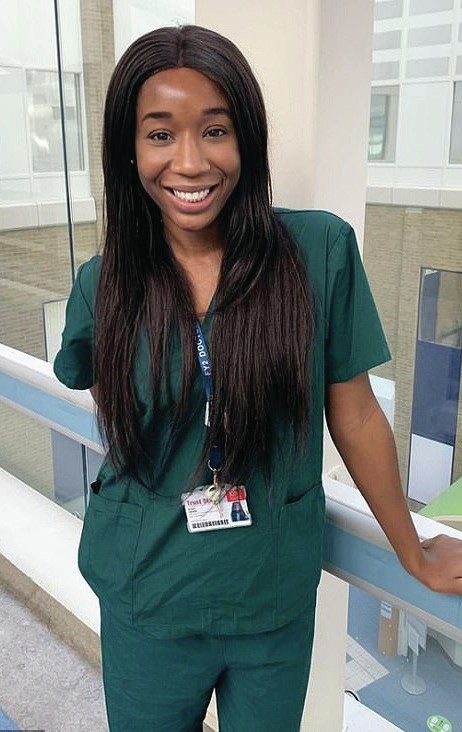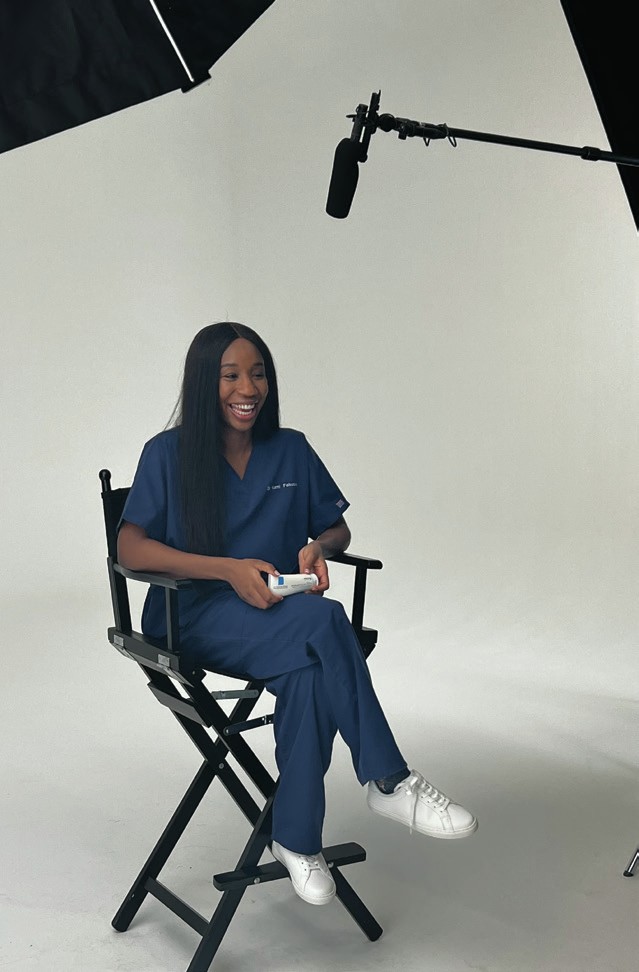Online with DR FAB
From NHS frontline to digital dominance: Dr Kemi Fabusiwa discusses her journey into entrepreneurship with Kezia Parkins…
If you don’t already know Dr Kemi Fabusiwa, better known as Dr Fab –The Bodycare Doctor, it may be a sign that you need to spend more time on social media. With over 225,000 followers on Instagram, she has become one of the UK’s most recognisable doctors, using her signature mix of humour and education to break down everything from acne to body odour.
But before she became a digital trailblazer, Dr Fabusiwa was on the frontline of the Covid-19 pandemic, working as an NHS junior doctor in London hospitals.
“I was only a few months into my first job when Covid hit,” she recalls. “I don’t think I really started to feel disillusioned with the NHS during that time. In a strange way, it felt good. Everyone was pulling together, all hands on deck, part of something important.”
It was only later, after years of gruelling hours in general medicine, that the cracks began to show.
Doctors are natural educators. We learn how to teach patients, how to communicate clearly. Social media is just doing that on a bigger stage.
“Many doctors will tell you they love the job itself. But working that much can be physically, emotionally, and financially unsustainable. Especially when what you’re putting in doesn’t match what you’re getting out,” she explains.
Hitting her thirties, Dr Fabusiwa found herself reflecting on the realities of her future.
“I was looking around at people my age buying homes and building lives, and I was working so hard but couldn’t get there. That was the moment I realised that general medicine, realistically, was never going to give me that security.”
She points to an ingrained culture in medicine that avoids talking about money.
“I feel like we are conditioned to not really talk about money in medicine. You’re constantly told that you shouldn’t aspire to even basic things. With previous generations, many of the people who became doctors came from money anyway. So when they tell younger doctors not to care about money, it comes from a completely skewed perspective.
“But our generation is different. We’re from all kinds of backgrounds. So telling us we shouldn’t care about money is very short-sighted, especially when those views are coming from people who are saying it from their homes and positions of luxury.”

Fab in her junior doctor days.

Dr Fab BTS filming for big brands.
BECOMING AN ENTREPRENEUR
This year, Dr Fabusiwa made the leap, leaving the NHS to pursue her entrepreneurial path full-time.
“I’ve always been an entrepreneur at heart,” she says. “Now I feel like I’m finally doing what I was meant to do and bringing my expertise into a space where I can really live the life I want.”
Uniquely, her content focuses heavily on body skin concerns, while most professional influencers in the space tend to focus on the face. She covers everything from keratosis pilaris to sweaty feet, and lesser-known conditions that are rarely addressed with such candour online. Her approach has filled a gap, making her content stand out globally to patients and brands who are now scrambling to work with her.
Like many people with such intense passion for what they do, it stems from personal experience. “I had severe acne, scarring, and hyperpigmentation at medical school. It was disfiguring and really knocked my confidence. Going through the same treatments that many of my patients go through, like Roaccutane, made me realise how transformative dermatology could be. I wanted to help others the way I’d been helped.”
BREAKING BARRIERS
Dr Fabusiwa’s use of social media has also amplified conversations about diversity in skincare education. She makes a conscious effort to showcase conditions on darker skin tones, something long neglected in traditional textbooks.
“It’s still incredibly difficult to find good quality images on darker skin. Sometimes it takes me hours of searching. I think many professionals actually have good intentions when it comes to diversity, but give up. If you really have to go out of your way to include people, it just highlights another way that exclusion is perpetuated.”
One of the conditions she is helping to spotlight is hidradenitis suppurativa (HS), a painful inflammatory disease disproportionately affecting Black patients. Meanwhile this group is rarely represented in the research. “Whenever I post about HS, it goes viral. People are clearly in need of information,” she says.
Through her platform Joyful Skin, she now provides e-books and masterclasses on acne and Black skin, bringing accessible expertise to audiences often overlooked in dermatology education.
That’s the thing! You never know when your content will click for people.
BUILDING AUTHORITY ONLINE
For all its rewards, building an online platform didn’t come easily.
“It took me a year to get 1,000 followers,” she admits. “The way I was creating content wasn’t sustainable. It was a lot of work for little return, but I kept going. By year two, I had 8,000, and then suddenly, in one month, I gained 100,000 followers. That’s the thing! You never know when your content will click for people.”
The effort has paid off not only in reach but also in credibility. “Because of social media, I’ve had more academic opportunities than some peers who are hardcore researchers. I was able to join the editorial team for the British Journal of Dermatology. These doors opened because people saw my work online.”
There is so much incredible cutting-edge research that goes under the radar, but with social media, we were able to bring that to everyone.”
She sees social media as an extension of her medical training. “Doctors are natural educators. We learn how to teach patients, how to communicate clearly. Social media is just doing that on a bigger stage. Of course, you’re held to a high standard, as you should be, but the impact is worth it,” she says.
“Many doctors are on social media now, from all areas of medicine. I’m seeing more GPs on social media giving digestible education, and I think it really helps to bridge that gap and democratise who gets to have information.”
AUTHENTIC AND RELATABLE
Part of Dr Fabusiwa’s success is her relatability. “I’m a South London girl from Croydon, and I’m proud of that. I keep it real, and I speak in my own tone of voice. I want my content to feel like it’s coming from a friend as much as a doctor.”
She is a testament to the concept of ‘going for it’ and living the life you have always dreamed of. Her only regret, she says, is that she didn’t start her platform sooner.
Along her journey from NHS frontlines to becoming a renowned digital doctor, her definition of self-care has evolved. “I used to think wellness meant waking up at 5am, drinking nasty celery juice, and forcing myself on a run. Now, I know it can just as easily mean watching Love Island with a glass of wine. It’s about balance.”
For Dr Fabusiwa, that balance now extends to her career. She has carved out a niche that blends medical authority, entrepreneurship, and accessibility, reshaping what it means to be a modern doctor.
Get inspired by Dr Fab on Instagram.
Follow @dr.fab